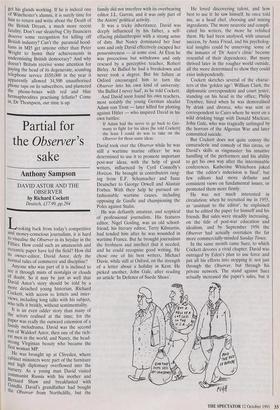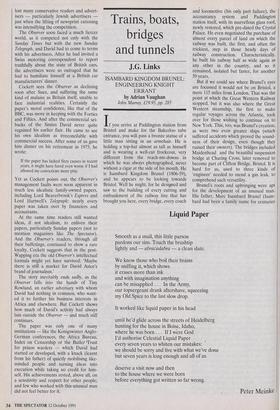Partial for the Observer's sake
Anthony Sampson
DAVID ASTOR AND THE OBSERVER by Richard Cockett Deutsch, £17.99, pp.294 Looking back from today's competitive and money-conscious journalism, it is hard to visualise the Observer in its heyday in the Fifties. How could such an amateurish and eccentric paper have led the field? How did its owner-editor, David Astor, defy the normal rules of commerce and discipline?
Anyone who was part of it is inclined to see it through mists of nostalgia or clouds of doubt. So it may be just as well that David Astor's story should be told by a more detached young historian, Richard Cockett, with access to letters and inter- views, including long talks with his subject, who tells it briskly, without sentimentality.
It is an even odder story than many of the actors realised at the time; for the paper was really the outward extension of a family melodrama. David was the second 80n of Waldorf Astor, then one of the rich- est men in the world, and Nancy, the head- strong Virginian beauty who became the first woman MP.
He was brought up at Cliveden, where cabinet ministers were part of the furniture and high diplomacy overflowed into the nursery. As a young man David visited communist Russia with his mother and Bernard Shaw and breakfasted with Gandhi. David's grandfather had bought the Observer from Northcliffe, but the
family did not interfere with its overbearing editor J.L. Garvin, and it was only part of the Astors' political activity.
It was a tricky inheritance. David was deeply influenced by his father, a self- effacing philanthropist with a strong sense of duty. But Nancy dominated her four sons and only David effectively escaped her possessiveness — at some cost. At Eton he was precocious but withdrawn and only rescued by a perceptive teacher, Robert Birley. At Balliol he had a breakdown and never took a degree. But his failure at Oxford encouraged him to turn the Observer into his own kind of university: `the Balliol I never had', as he told Cockett.
And David soon found his own teachers, most notably the young German idealist Adam von Trott — later killed for plotting against Hitler — who inspired David in his own battles:
If Adam had the nerve to go back to Ger- many to fight for his ideas (he told Cockett] the least I could do was to take on the Observer for those same ideas.
David took over the Observer while he was still a wartime marine officer: he was determined to use it to promote important post-war ideas, with the help of good writers, influenced by Cyril Connolly's Horizon. He brought in contributors rang- ing from E.F. Schumacher and Isaac Deutscher to George Orwell and Alastair Forbes. With their help he pursued un- fashionable wartime causes, including opposing de Gaulle and championing the Poles against Stalin.
He was defiantly amateur, and sceptical of professional journalists. His features editor, Nigel Gosling, was an old school- friend, his literary editor, Terry Kilmartin, had tended him after he was wounded in wartime France. But he brought journalism the freshness and intellect that it needed, and he could recognise good writing. He chose one of his best writers, Michael Davie, while still at Oxford, on the strength of a letter about a holiday in Kent. He picked another, John Gale, after reading an article 'In Defence of Suede Shoes'.
He loved discovering talent, and how best to use it: he saw himself, he once told me, as a head chef, choosing and mixing ingredients. The more neurotic and compli- cated his writers, the more he relished them. He had been analysed, with unusual success, by Anna Freud, and his psycholog- ical insights could be unnerving: some of the inmates of 'Dr Astor's clinic' became resentful of their dependence. But many thrived later in the rougher world outside, all the more determined to show they could exist independently.
Cockett sketches several of the charac- ters of this 'golden age': William Clark, the diplomatic correspondent and court jester, standing on his head in the office; Philip Toynbee, hired when he was demoralised by drink and divorce, who was sent as correspondent to Cairo where he went on a wild drinking binge with Donald Maclean; John Gale, who was tragically unhinged by the horrors of the Algerian War and later committed suicide.
But Cockett does not quite convey the camaraderie and comedy of this circus, or David's skills as ringmaster: his intuitive handling of the performers and his ability to get his own way after the interminable conferences. Katherine Whitehorn joked that 'the editor's indecision is final'; but few editors had more definite and consistent views on fundamental issues, or promoted them more firmly.
He was not much interested in circulation: when he recruited me in 1955, as 'assistant to the editor', he explained that he edited the paper for himself and his friends. But sales were steadily increasing, on the tide of post-war education and idealism, and by September 1956 the Observer had actually overtaken the far more commercially-minded Sunday Times.
In the same month came Suez, to which Cockett devotes a vivid chapter. David was outraged by Eden's plan to use force and put all his efforts into stopping it: not just through the Observer, but through his private network. The stand against Suez actually increased the paper's sales, but it
lost many conservative readers and advert- isers — particularly Jewish advertisers just when the lifting of newsprint rationing was intensifying the competition.
The Observer soon faced a much fiercer world, as it competed not only with the Sunday Times but with the new Sunday Telegraph, and David had to come to terms with his advertisers. After he had invited a Swiss motoring correspondent to report truthfully about the state of British cars, the advertisers were so outraged that he had to humiliate himself at a British car manufacturers' dinner.
Cockett sees the Observer as declining soon after Suez, and suffering the same kind of malaise as Britain itself, unable to face industrial realities. Certainly the paper's moral confidence, like that of the BBC, was more in keeping with the Forties and Fifties. And after the commercial set- backs of the Sixties David never quite regained his earlier flair. He came to see his own idealism as irreconcilable with commercial success. After some of us gave him dinner on his retirement in 1975, he wrote: If the paper has lacked fiery causes in recent years, it might have fared even worse if I had allowed my convictions more play.
Yet as Cockett points out, the Observer's management faults were soon apparent in much less idealistic family-owned papers, including Lord Beaverbrook's Express and Lord Hartwell's Telegraph: nearly every paper was taken over by financiers and accountants.
At the same time readers still wanted ideas, if not idealism, to enliven their papers, particularly Sunday papers (not to mention magazines like The Spectator). And the Observer's readers, through all their buffetings, continued to show a rare loyalty. Cockett suggests that in the post- Wapping era the old Observer's intellectual formula might yet have survived: 'Maybe there is still a market for David Astor's brand of journalism.'
The story inevitably ends sadly, as the Observer falls into the hands of Tiny Rowland, an earlier adversary with whom David had nothing in common, who want- ed it to further his business interests in Africa and elsewhere. But Cockett shows how much of David's activity had always lain outside the Observer — and much still continues.
The paper was only one of many institutions — like the Konigswinter Anglo- German conferences, the Africa Bureau, Index on Censorship or the Butler Trust for prison warders — which David had started or developed, with a knack (learnt from his father) of quietly mobilising like- minded people and turning ideas into execution while taking no credit for him- self. His achievements rested, above all, on a sensitivity and respect for other people; and few who worked with this unusual man did not feel better for it.



























































 Previous page
Previous page